![[MetroActive Music]](/gifs/music468.gif)
[ Music Index | North Bay | MetroActive Central | Archives ]
Sour Note
When it comes to his 'Jazz' series, filmmaker Ken Burns could have done better
By Harvey Pekar
IN ORDER to understand Ken Burns' objectives in his 10-segment, 19-hour PBS series Jazz, let me quote some of his comments: "All the jazz critics who are sort of sharpening their knives miss the whole point of this. . . . I see jazz as a particularly objective mirror of who we are as a people, far beyond the music, and telling the story of the music helps us understand ourselves in a much larger sense. . . . What we're trying to do is enlarge the jazz audience. These people in their 'academic purity,' you know, are not being friends of the music they purport to love. . . .
"I'm not really concerned with the jazz community. . . I have to focus most of my attention on reaching that 99 percent for whom jazz is an esoteric, dense, and unapproachable music, made so not by the music but by the people who talk, write, argue, and fight about it. So there is a paradox."
What Burns seems to be saying is that jazz would be far more popular if people quit arguing about it and united to praise his work. Unfortunately, as part of the crotchety 1 percent, I find that Burns' series leaves a lot to be desired, and most of the people I've talked to about it have been disappointed to at least some extent, though some say, "Well, at least it's better than nothing."
Burns admits that he knew virtually nothing about jazz before beginning his project and that General Motors "gave us 35 percent of the $14 million budget for Jazz." In fact, a publicist for the project asked me to be sure to mention GM's sponsorship of the series in this article.
GM is putting up that kind of money for a reason. The company views it as an investment aimed at improving public relations and ultimately selling more products. To do that Burns is going to have to reach a mass audience. Therefore he can't make his work too intellectually rigorous and has to incorporate discussions of nonmusical subjects that nonjazz fans will find interesting. This should not have been difficult for him to accomplish, since he already wants to use jazz history to attempt to mirror the American people "far beyond the music" and to "help us understand ourselves in a much larger sense."
It is understandable then, that Jazz--which debuted Jan. 8 and airs on selected nights through Jan. 31--contains much political and social material in it about race relations, the Depression, World War II, and other topics that have a more general appeal to viewers than jazz.
The series' narrators and interviewees emphasize anecdotal material rather than technical music commentary. There is much information provided here about the substance abuse problems of jazz artists, from Buddy Bolden to Charlie Parker. Interviewees include not only musicians but also a number of authors, some of whom don't specialize in writing about jazz, plus Negro League baseball great Buck O'Neil and actor Ossie Davis. They, like many of the commentators, offer the kind of not-particularly-enlightening impressions about jazz that one could get from just about any fan. One assumes they're on Burn's roster to provide celebrity appeal, in Davis' case, and the recollections of a grand old man, in O'Neil's.
The 10 programs are arranged chronologically. The acute viewer will notice that the first through ninth programs cover periods of from three to 10 years each; the 10th deals with 40 years--or 40 per cent--of jazz history.
At least that's the way I see it.
Lynn Novick, who co-produced Jazz with Burns, has a different definition of history than mine. In interviewing her, I mentioned that to me history is everything that'd happened, even if it was one second ago. But Novick didn't agree. To her, events aren't history until a consensus about them has been reached and set in stone. Like Burns, she thought the jury was still out on many jazz musicians who had come to the fore since 1960, and consequently they are given short shrift or no shrift in Jazz, although some are middle-aged or old by now. Novick urged me, even if I thought experimental jazz artists of the past 40 years had been given too little attention during the last show, to consider seriously and hopefully praise the other nine episodes.
To her, I was most critical of only 10 per cent of the series.
However, Burns and Co. have virtually ignored almost 40 per cent of jazz's history. Even in the last chapter, the work of innovative young jazz musicians and new developments in the idiom were dealt with less than the latter stages of the careers of Louis Armstrong and Duke Ellington, who are covered from birth to death, and even less than the work of reactionary younger musicians like Wynton Marsalis, Joshua Redman, and James Carter, all of whom employ styles that were created before they were born and are very imitative musicians with no interest in adding to jazz's vocabulary, expanding boundaries, pushing envelopes, etc. Joshua Redman's father, Dewey, in fact, is a more modern stylist than he is. The Dixieland revivalists of the 1940s--Lu Watters, Turk Murphy, Bob Scobey--are not mentioned in Jazz because their work was so derivative.
Similarly, Marsalis and the so-called young lions have no business being covered, despite the large amount of media attention they've gotten, because they are just as derivative.
The idea implicit in the statements of Burns and Novick that the work of experimental musicians cannot be evaluated until decades after they've come to the fore is nonsensical. Consider Ornette Coleman. Before Coleman emerged, improvisers were taking more and more liberties with chord progressions, adhering less and less strictly to them. Moreover, beginning with Django Reinhardt's "Improvisation," cut in 1937, and continuing into the 1950s, a few free jazz records already had been made, most notably Lennie Tristano's Intuition and Digression. Even then, it seemed inevitable that a jazz musician would come along who would play free jazz on a regular rather than sporadic basis, and that whoever got national attention for doing this first would probably be recognized as a great artist. Coleman made this step, though he always credited Dallas/Fort Worth saxman Red Connor with doing it before him. He'd taken the necessary big step; he'd made the big breakthrough.
And, of course, he's in the jazz pantheon now.
If you follow the evolution of an art form closely and are able to enjoy innovations in it over the years, you shouldn't need a whole lot of time to evaluate the work of an avant-garde artist. Musicians, including free-jazz innovators Joe Maneri, John Zorn, Mark Dresser, Chris Speed, Joey Baron, and, going back to the 1960s, Albert Ayler, Anthony Braxton, Henry Threadgill and Paul Bley, have been keeping jazz or the jazz tradition alive, even if the Lincoln Center crowd doesn't want to recognize their work with their innovations, while Marsalis merely mimics earlier jazz artists. So guess who Burns makes the most visible figure in Jazz.
Marsalis, of course.
Burns tapped Marsalis as lead commentator for his series because the trumpeter is well known, the darling of PBS--a box office draw. I will say, though, that when it comes to pre-1960s, Marsalis knows what he's talking about. He has meticulously studied the styles of the men he copies and knows what makes them tick.
INDEED, Burns has been pretty shrewd about the way he's put this show together, regardless of how little use I have for it. It's mentioned in Jazz that "big-band swing accounted for 70 percent of the profits in the [American] music industry" at one time. Now Burns sees himself as an important chronicler of the American scene; he views his Civil War, baseball, and jazz series as an American trilogy. Beyond being a historian, he sees himself as a player, and wants to have a role in getting jazz back up toward that 70 percent share, as he's stated above, as does Novick. To do this Burns doesn't need to preach to the converted--that is, the small number of committed jazz fans. He's got to go after the uninitiated, and he has a pretty good idea of what they want, because until recently he was one of them, and he still probably doesn't know much about the music.
In any event, he's developed a strategy to hook the general public.
It involves the use of a large group of commentators, including writers, musicians, record producers, promoters, club owners, and musicians' wives and relatives.
Add O'Neil and Davis and you've got a varied and colorful group of people who chip in a bunch of anecdotes calculated to entertain a mass audience.
But Burns doesn't want to bore viewers with a lot of talk about mere jazz music, so he dilutes it by dealing with other issues, some "far beyond the music . . . to help us understand ourselves in a larger sense." In the process, we learn that Burns has some beliefs that all of us can agree with and rally behind. He is, for example, for democracy and racial equality and against lynching and fascism.
Moreover, Burns is always looking at jazz as a microcosm or a metaphor. He's stated, "[J]azz. . . in addition to being a pretty objective witness to the 20th century, was also a vision of the redemptive future possibilities of our republic. Because embedded in the message of jazz is a finely tuned constitution at work: all people listening, incorporating, dealing with the question of the individual as well as the collective. And you have essentially in jazz a model of what we become when we live out, as Dr. King would say, the true meaning of our creed."
Marsalis opens one show by saying that "jazz objectifies America." We learn also from Marsalis that a jazz band works the same way a democracy does. And Burns plays the patriotism card. We are told that only in America could jazz have evolved.
Bleah!
I wonder if Burns has considered that only in Eastern Europe did klezmer evolve, only in Cuba did the son evolve, only in Brazil did the samba evolve, only in Italy did Italian opera evolve, only in France did French pastry evolve. Every nation has something unique about it, for crying out loud.
Regarding the similarities between jazz and democracy, jazz isn't unique in being a form of collective activity that involves cooperation between individuals. Volleyball does as well. Can we, then, look forward to Burns doing a series on the history of volleyball?
I realize that the history of jazz may not seem as important in itself to Burns as other "larger" issues. On the other hand, I'm sick of writers and filmmakers who use music as a means to an end to discuss their favorite political and social issues. Frequently they do this because they don't have anything important to say about the music. I wish more of them would deal more directly with the stuff that's most important to them instead of trying to get at it in a roundabout way that is sometimes ludicrous.
Jazz is important enough to be dealt with as an end in itself. As it is, Burns deals with jazz and politics in a half-baked way.
As for the notion that Jazz is going to play a part in reviving the music, Burns can forget it, although there may be a slight upturn in record sales. A relatively small number of retro performers, including Marsalis and Redman, are doing well for themselves, but they're not going to bring back the days when jazz and pop music were virtually synonymous. The vast majority of young people are involved with the music of today, not 50 years ago. Moreover, from the advent of bop to the present, ,jazz has been too difficult for most people to make sense of. The average listener cannot follow a 1948 Charlie Parker solo any more than figure out a 75-year-old Arnold Schoenberg composition or a Mark Rothko abstract painting.
Throughout the 19th century, the public was able to catch up with the work of experimental artists after a few decades had passed. However, 20th-century modernism confuses people now as much as it did in 1915 or 1930.
What Burns could've done without damaging the commercial appeal of his series was to give more attention to the efforts of today's innovators, whose performances might have posed difficulties for most viewers, but no more so than the stuff he used by Parker, Coltrane, and Coleman. Guys like Maneri and Dresser are unlikely to get rich with their music, but more people out there would support them if they could at least hear it.
I wish Burns had shown more interest in supporting the living.
IN ADDITION to the television show, a five-CD history of jazz, Ken Burns Jazz: The Story of America's Music (Epic/Legacy/Verve) and a $65 coffee-table book, Jazz: A History of America's Music (Knopf; 2000), have been on the market for weeks to take advantage of the holiday retail opportunities.
The five-CD set, issued jointly by Columbia and Verve, draws material from many labels and is fine up to a point. Keep in mind, though, that just about any reasonably intelligent person could've put together four of the first five volumes if they'd read several good histories of jazz. The material on them is not only great, but often mentioned. However, the fifth volume contains some pretty debatable choices, dictated to an extent by opportunism.
But what's really a drag is that there is a track a piece on the final CD by Marsalis and by his Lincoln Center repertoire band. Columbia co-produced this set, and apparently was determined to have its star attraction, Marsalis, represented, as ludicrous as it is to have him in the same set as Armstrong, Ellington, and Parker.
As in the TV series, a bunch of important innovators from the 1960s to the present aren't included on the Jazz CDs.
Burns and Geoffrey Ward are co-credited with having written the Jazz book, but Ward, who wrote the TV narratives for Jazz, Baseball, and The Civil War seems to have done most of the work. The basis for the Jazz book is his TV script, and, like it, the book is composed of 10 segments covering essentially the same material.
The book opens with Burn's banal, cliché-ridden preface, during which it is claimed that "the genius of America is improvisation," and that "the Constitution is the greatest improvisational document ever created."
Pardon me, but the U.S. Constitution was not written in half an hour; its creation involved a great deal of preparation, debate, and discussion; it was not improvised, as ordinary school kids know. So what kind of crap are you handing us?
Burns then goes on to make the claim that Jazz offers "the explosive hypothesis that those who had the experience of being unfree in a free land might actually be at the center of our history. African-Americans in general, and black musicians in particular, carry a complicated message to the rest of us, a reminder of our great promise and our great failing, and the music they created and then generously shared with the rest of the world processes the contradictions many of us would rather ignore."
This statement is a lot of melodramatic nonsense. Consider Burns' contention that African-Americans "generously shared" their music with the rest of the world. Actually, non-African-Americans heard jazz, liked it, copied it, and/or shaped and modified it to suit their needs, just as African-Americans did with the music they heard that was created by whites in the States. It's an aesthetically healthy exchange, but it's mostly about hearing and taking without permission.
Remarkable as jazz is, Burns' statements about it are sometimes nebulous, hyperbolic, and absurd. He can make it a metaphor for anything he wants to, but jazz is a form of music, not a political movement. Moreover, he has ignored the musicians who are keeping it alive currently, that are adding to its vocabulary.
When I was a schoolkid, it always bothered me that history courses ended long before the present. I took a music appreciation course in 1951, and the most modern composer discussed was Tschaikowsky. The world history course ended with World War I. To me, history is useful primarily because of the light it sheds on contemporary events; the further it stops from the present, the less relevant it often is for me. By ignoring recent developments in jazz history, Burns makes it appear that its evolution is over.
By devoting so much time in his series to political issues and so little to music, he implicitly undermines jazz's importance.
He does this explicitly when he constantly refers to jazz as part of a bigger picture, and as a metaphor. Burns' work doesn't harm jazz overall; it'll probably help sell some recordings. It's better than nothing. And because jazz is so difficult for Burns' 99 percent of the public to understand, there's not much he could've done for it.
But, man, he could've done better by it.
[ North Bay | MetroActive Central | Archives ]
Copyright © Metro Publishing Inc. Maintained by Boulevards New Media.
![]()
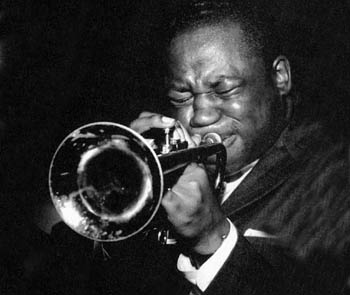
Trumpet master: Clifford Brown, who died in a 1956 car crash, remains a major influence on today's young jazz lions.
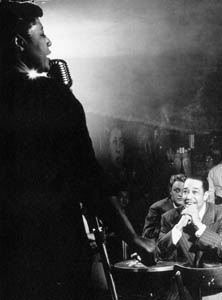 It don't mean a thing...: Duke Ellington savors Ella Fitzgerald's show.
It don't mean a thing...: Duke Ellington savors Ella Fitzgerald's show.
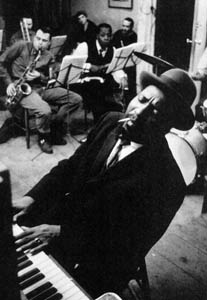 Livin' on Monk time: Composer Thelonious Sphere Monk was dismissed by many as an eccentric with little talent. How wrong critics can be.
Livin' on Monk time: Composer Thelonious Sphere Monk was dismissed by many as an eccentric with little talent. How wrong critics can be.
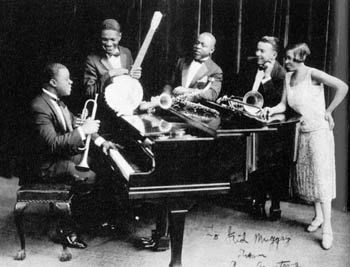
The Hot Five: Trumpeter and jazz innovator Louis Armstrong (seated) with Johnny St. Cyr, Johnny Dodds, Kid Ory, and Lil Hardin Armstrong, circa 1925.
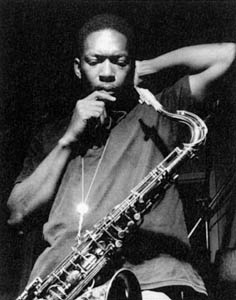 A love supreme: John Coltrane
A love supreme: John Coltrane
Jazz critic and comic-book artist Harvey Pekar lives in Texas. A longer version of this article appears this week in the 'Austin Chronicle.'
From the January 11-17, 2001 issue of the Northern California Bohemian.